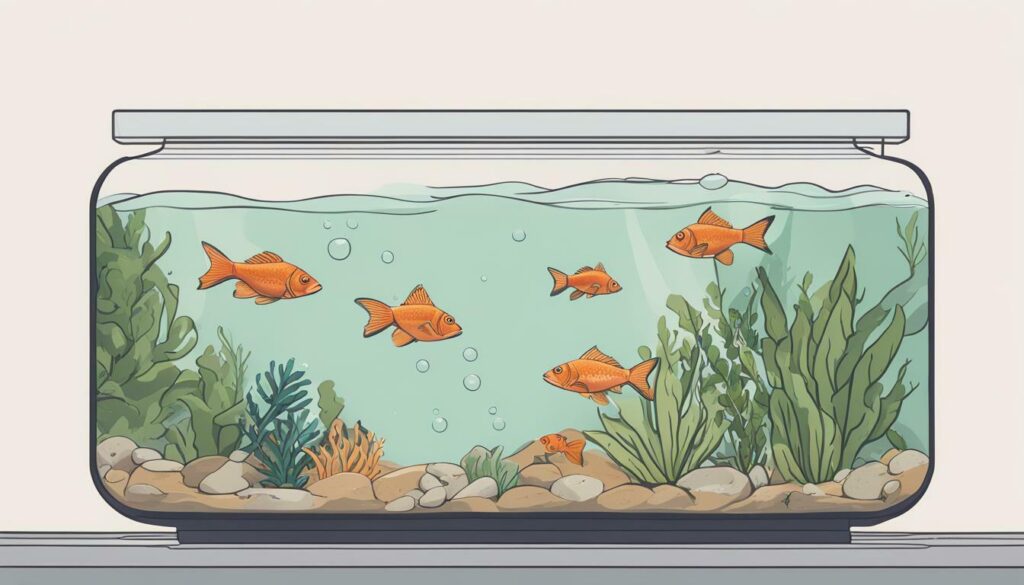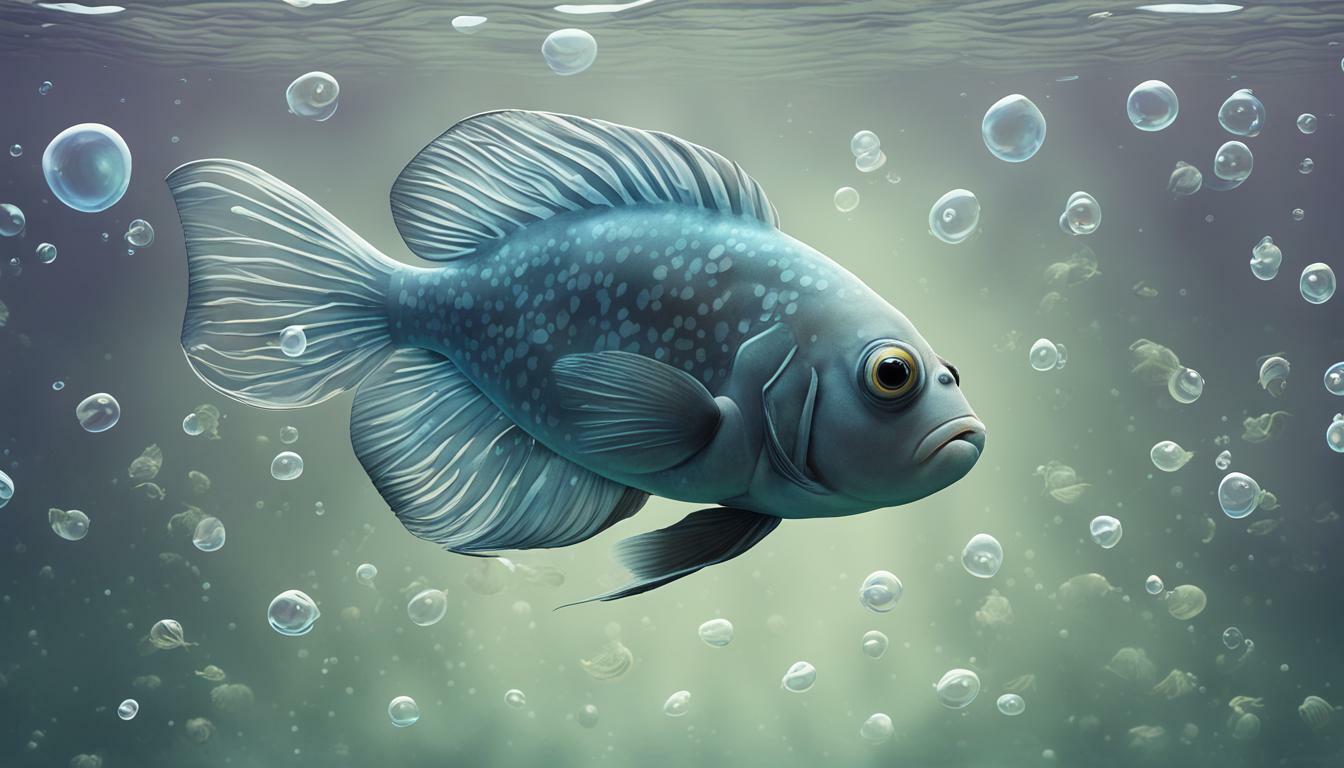Welcome to our guide on aquarium fish bloating. As aquarium enthusiasts, we know how important it is to maintain our fish’s health and wellbeing. Unfortunately, bloating is a common issue that can affect our fish friends, leading to discomfort and even serious health complications.
In this article, we will explore the causes of fish bloating and provide you with practical solutions for treating and preventing it. We’ll cover everything from identifying the symptoms of bloating to adjusting your fish’s diet and maintaining optimal water conditions.
Key Takeaways:
- Bloating is a common issue that affects aquarium fish.
- Early detection and proactive care are crucial for maintaining your fish’s health.
- There are various causes of fish bloating, including overfeeding and poor water quality.
- Treating and preventing bloating requires a combination of short-term remedies and long-term solutions.
- Maintaining proper nutrition and water quality are essential for preventing bloating.
Understanding Bloated Fish in Aquariums
As aquarium fish owners, we all want our fish to be healthy and happy. However, sometimes our fish can become bloated, which can be a sign of an underlying problem. Understanding what bloated fish in aquariums means and the common symptoms to look out for is crucial for early detection and proactive care.
Bloated fish in aquariums refer to fish that have swollen bellies beyond their normal size due to either overeating or underlying health conditions.
Some common symptoms of bloated fish include:
| Symptoms | Description |
|---|---|
| Bulging Belly | The fish’s belly is visibly swollen |
| Loss of Appetite | The fish does not show interest in food or eats less than usual |
| Lethargy | The fish is inactive and does not move around as much as usual |
| Abnormal Swimming | The fish may swim upside down or sideways |
It’s worth noting that not all bloated fish exhibit these symptoms, and some may show only one or two. It’s important to closely monitor your fish for any changes in appearance or behavior.
If you notice any of these symptoms, it’s crucial to take action to diagnose and treat the underlying issue. Ignoring the issue could lead to serious health problems for your fish.

Understanding Bloated Fish in Aquariums: What Causes It?
Causes of Fish Bloating
Understanding the causes of fish bloating is crucial for maintaining a healthy aquarium environment. Let’s explore some of the common factors that contribute to this condition:
| Cause | Description |
|---|---|
| Overfeeding | Feeding fish too much or too often can overload their digestive system and cause bloating. Excess food can also lead to water pollution, which further exacerbates the problem. |
| Poor water quality | Unclean water can contain harmful toxins and bacteria that can damage a fish’s internal organs and disrupt their digestive system. Additionally, high levels of ammonia and nitrite can cause bloating and other health problems. |
| Digestive issues | Some fish may be more prone to digestive problems than others, and this can lead to bloating. Common digestive issues include constipation, malabsorption, and intestinal blockages. |
| Underlying health conditions | Various health conditions, such as swim bladder disease or dropsy, can cause fish to become bloated. These conditions may require specific treatments and should be addressed promptly to prevent further complications. |
It’s important to note that some fish species are more susceptible to bloating than others. For example, fancy goldfish and bettas have a higher risk of developing this condition due to their unique body structures and dietary needs.

Next, let’s dive into how to recognize when your fish is experiencing digestion problems.
Identifying Digestion Problems in Fish
Proper digestion is crucial for overall fish health and can significantly impact whether a fish becomes bloated. Unfortunately, digestion problems are common among aquarium fish, and it’s important to be able to identify when your fish may be experiencing an issue.
The most common signs of digestion problems in fish include:
- Loss of appetite
- Abnormal feces (color, consistency, or frequency)
- Lethargy or swimming erratically
- Visible inflammation or swelling around the abdomen
If you notice any of these symptoms, it’s essential to take action promptly. The longer you wait, the more likely the problem will worsen, leading to further complications such as fish bloating.
Identifying feeding patterns and the type of food your fish eat can help determine if they’re experiencing digestion problems. Some fish species require specific diets that may not be met with just any commercial fish food. Additionally, feeding your fish low-quality or expired food can cause digestion issues and lead to bloating or other health problems.

Tip: Monitor your fish’s eating habits and adjust their diet accordingly. If you are unsure what type of food to feed your fish, consult with a veterinarian or an experienced aquarium hobbyist for guidance.
Treating Bloated Fish
If you notice that your aquarium fish is bloated, it’s important to take action promptly to ensure its health and prevent further complications. Here are some tips for treating bloated fish:
1. Fasting
One effective way to treat bloated fish is to fast them for 24-48 hours. This gives their digestive system a chance to clear out any undigested food and can help alleviate bloating. After the fast, resume feeding slowly and in smaller portions to avoid overfeeding.
2. Medications
In some cases, medications may be necessary to treat bloated fish. Anti-bloating medications can help alleviate discomfort and reduce bloating. Be sure to follow the dosage instructions carefully and consult with a veterinarian if necessary.
3. Adjust Feeding Habits
Overfeeding is a common cause of bloating in fish. Adjusting your feeding habits by feeding smaller portions and cutting back on frequency can help prevent bloating in the future.
4. Check Water Parameters
Water quality can also contribute to fish bloating. Check the temperature, pH levels, and ammonia levels regularly and make necessary adjustments. A water change may also be needed to improve water quality.

Remember, prevention is the best treatment. By maintaining proper feeding habits, water quality, and overall aquarium health, you can help prevent bloating and other health issues in your aquarium fish.
Preventing Fish Bloating
Now that we know the causes and treatments for fish bloating, let’s focus on prevention. By taking a proactive approach and implementing these tips, we can help our fish avoid bloating and maintain optimal health.
Feeding Techniques
One of the most common causes of fish bloating is overfeeding. To prevent this, we should only feed our fish what they can consume in a few minutes and avoid leaving excess food in the tank. It’s also essential to provide a balanced diet that meets our specific fish species’ nutritional needs.
One strategy is to feed our fish small meals throughout the day rather than one large feeding. This approach mimics their natural feeding habits and can improve digestion and prevent bloating.
Aquarium Conditions
Another essential factor in preventing fish bloating is maintaining optimal water conditions. This includes regular water testing, appropriate temperature and pH levels, and performing frequent water changes. Poor water quality can stress fish, impair digestion, and contribute to bloating.
It’s also crucial to ensure our aquarium is the appropriate size for our fish and provides adequate space for swimming and hiding. Overcrowding and inadequate tank size can increase stress and disease susceptibility.
Proper Filtration
Proper filtration is another critical component for a healthy aquarium environment. It helps remove waste and debris, improving water quality and preventing digestive issues. We should select a filtration system that meets our tank’s size and bioload requirements and clean or replace filters as instructed by the manufacturer.
Avoiding Stress
Finally, it’s essential to minimize stress in our fish as stress can lead to weakened immune systems and digestive difficulties. We should avoid sudden changes in water conditions, overcrowding, aggressive tankmates, and physical disturbances. Providing a suitable environment and adequate hiding spaces can help reduce stress and promote relaxation.

By following these tips for preventing fish bloating, we can ensure our fish remain healthy and happy in our aquariums. Remember, good care starts with prevention, and by taking proactive steps, we can avoid many common health issues.
Providing Proper Nutrition for Your Fish
Just like humans, fish need a balanced diet to maintain good health. Providing your fish with the right nutrition is essential in preventing bloating and ensuring overall well-being.
There are several types of fish food available, including flakes, pellets, frozen, and live food. It’s important to choose the right type of food for your fish based on their species, size, and dietary requirements. Consult with your local pet store or research online to determine the most suitable food options for your fish.
Overfeeding can lead to bloating and other health issues, so it’s crucial to monitor your fish’s feeding habits and adjust accordingly. A general rule of thumb is to feed your fish 2-3 times a day with only as much food as they can consume in 2-3 minutes.
Fun Fact: Did you know that some fish species, such as bettas, prefer live food like brine shrimp or bloodworms? Providing live food can help stimulate their natural hunting instincts and provide essential nutrients.

By providing a balanced diet and avoiding overfeeding, you can help prevent bloating and ensure your fish’s overall health and well-being.
Monitoring Water Quality
Maintaining optimal water conditions is key to preventing fish bloating and ensuring the overall health of your aquarium. Here are some tips for monitoring and maintaining water quality:
| Tip | Description |
|---|---|
| Regular testing | Test the water regularly to ensure it meets the appropriate pH and temperature levels for your specific fish species. Use a water testing kit to monitor ammonia, nitrite, and nitrate levels and adjust as needed. |
| Proper filtration | Choose the appropriate filter for your tank size and follow the manufacturer’s instructions for proper maintenance and cleaning. A good filter will keep the water clean and clear by removing excess waste and debris. |
| Water changes | Perform regular water changes to remove accumulated waste and replenish essential minerals and nutrients. The frequency and amount of water changes depend on the size of your tank and the number of fish living in it. |
Remember, the quality of the water is critical to the health and well-being of your fish. By monitoring and maintaining it regularly, you can prevent the onset of bloating and other health issues.

Seeking Veterinary Care for Bloated Fish
If your fish’s bloating doesn’t improve after following the previous steps, it’s time to seek professional help. A veterinarian with experience in fish care can diagnose the underlying cause of the bloating and provide treatment recommendations.
During your visit, the vet may perform a physical exam or take a water sample for testing. They may also prescribe medications or recommend further dietary adjustments or specialized food.
It’s important to seek veterinary care promptly if you notice any symptoms of illness or distress in your fish, including bloating. Early intervention can make a significant difference in the success of treatment.

Tips for a Healthier Aquarium Environment
Regular maintenance of your aquarium is essential to ensure the health of your fish. Here are some tips to keep your aquarium environment clean and healthy:
- Check your water chemistry regularly: Maintain proper pH levels and ensure the water temperature is optimal for your fish species.
- Clean your aquarium regularly: Perform regular water changes to remove excess waste and debris from the tank.
- Use a high-quality filter: Invest in a quality filter that will effectively remove debris and harmful substances from the water.
- Introduce compatible tankmates: Choose fish species that will thrive together and avoid overcrowding the tank.
- Provide proper lighting: Make sure your aquarium receives proper lighting to support plant growth and fish health.
- Feed your fish a balanced diet: Choose high-quality fish food that meets the nutritional requirements of your fish species.
By following these tips, you can maintain a clean and healthy aquarium environment for your fish. Remember, a healthy environment is key to preventing fish bloating and other health issues.

Conclusion
As aquarium enthusiasts, we want the best for our fish. By understanding the common causes of bloating and actively preventing and treating it, we can ensure the health and happiness of our aquatic friends.
Remember to keep an eye out for symptoms of bloating and address any potential issues as soon as possible. Proper feeding techniques, maintaining optimal water conditions, and introducing suitable tankmates can all contribute to a healthier aquarium environment.
But sometimes, despite our best efforts, professional veterinary care may be necessary. Don’t hesitate to seek the advice of a veterinarian if you notice any persistent signs of bloating or other health concerns.
We hope this article has provided valuable insights and solutions for dealing with bloated fish in aquariums. Let’s continue to prioritize the health and well-being of our underwater companions.
FAQ
Q: What causes fish bloating in aquariums?
A: Fish bloating in aquariums can be caused by a variety of factors, including overfeeding, poor water quality, digestive issues, and underlying health conditions.
Q: How can I identify if my fish is bloated?
A: Common symptoms of bloated fish include a distended abdomen, loss of appetite, lethargy, difficulty swimming, and buoyancy issues.
Q: What should I do if I suspect my fish is bloated?
A: If you suspect your fish is bloated, it is important to take immediate action. Start by fasting the fish for 1-2 days and closely monitor its behavior. If symptoms persist or worsen, consult a veterinarian for further guidance.
Q: How can I prevent fish bloating in my aquarium?
A: To prevent fish bloating, ensure you are practicing proper feeding techniques, maintaining optimal water conditions, and providing a suitable environment for your fish’s overall health. Regular water testing, appropriate temperature and pH levels, and regular tank maintenance are key.
Q: Can I treat fish bloating at home?
A: Yes, there are home remedies you can try to treat fish bloating, such as fasting the fish and using medications specifically designed for digestive issues. However, if symptoms persist or worsen, it is important to seek professional veterinary care.

